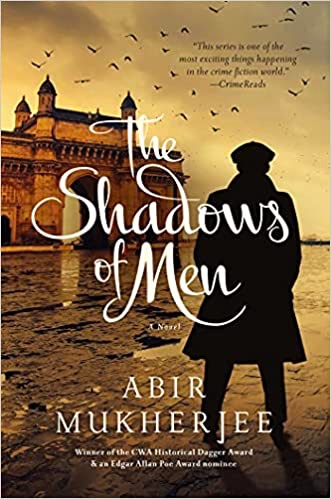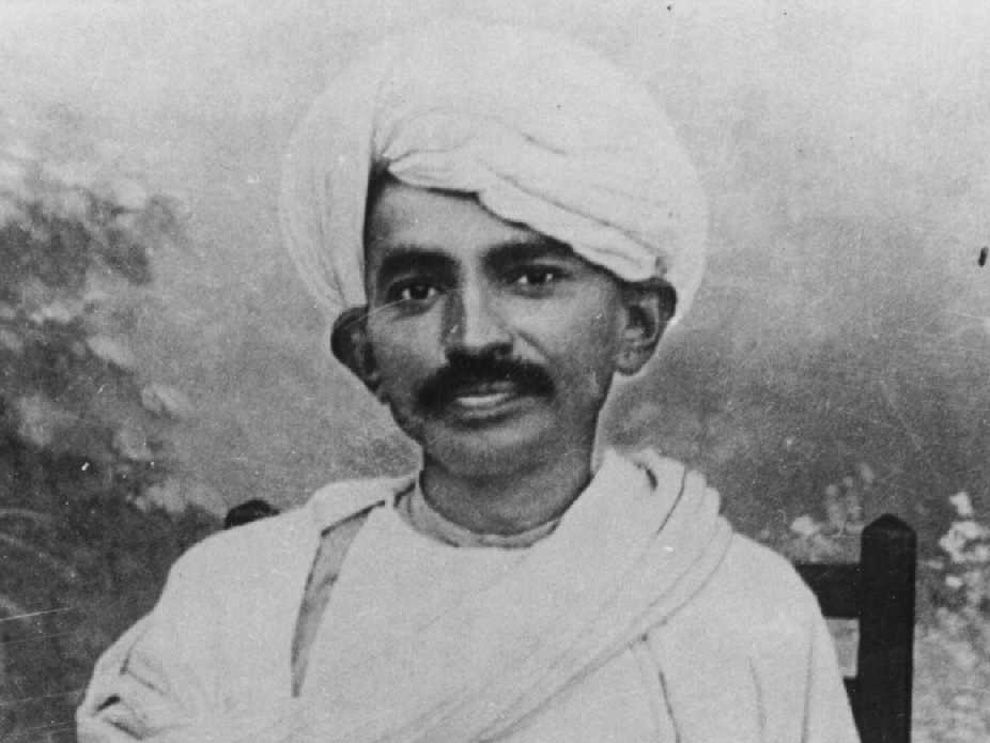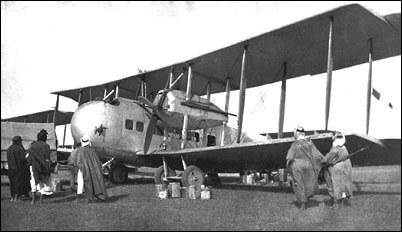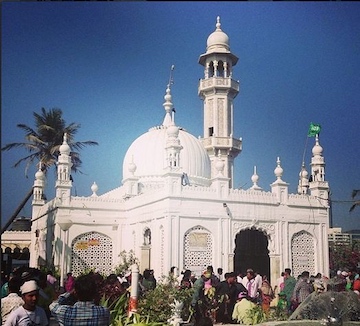“Men, I believe, are defined by the shadows they cast. Most, despite force of numbers and efforts, leave little trace. Like ants toiling under the noonday sun, their shadows are picayune and ephemeral. Others, like the trees of the forest canopy, cast a pall far greater…influencing all who fall beneath. But there are a deadly few who pass through invisible, yet leave everything altered in their wake…Those who have no shadow are the most dangerous of all.”
 In the fifth installment of the Wyndham and Banerjee mysteries, set in 1923, author Abir Mukherjee once again recreates the complex issues of colonialism in India after World War I, laying the groundwork for the tensions, the hostility among those of competing religious views, and the overriding fear that an all-out religious war might break out at any moment. The Hindus, Muslims, devotees of Mahatma Gandhi, and the British are all committed to keeping India free from tyranny, but each wants his own version of “freedom,” and no one agrees with anyone else. Author Abir Mukherjee is able to convey this confusion and frustration among all those of influence by using two very different characters. Sergeant Surendranath Banerjee, often known as “Surrender Not” Banerjee for his attitudes and the pun on his name – is a Hindu from Calcutta who is working with Sam Wyndham of the British Imperial Police Force, to try to bring peace and avoid anarchy as a result of all the competing social and religious interests. Suren sees British Sam as one who possesses “unhindered serenity. As untroubled and uncomprehending of such things as the elephant is by the barking of pariah dogs and oblivious to the Indian point of view.” After all, he says, “Even the lowest of them glides along with the air of those born to rule – not their own country, but ours.”
In the fifth installment of the Wyndham and Banerjee mysteries, set in 1923, author Abir Mukherjee once again recreates the complex issues of colonialism in India after World War I, laying the groundwork for the tensions, the hostility among those of competing religious views, and the overriding fear that an all-out religious war might break out at any moment. The Hindus, Muslims, devotees of Mahatma Gandhi, and the British are all committed to keeping India free from tyranny, but each wants his own version of “freedom,” and no one agrees with anyone else. Author Abir Mukherjee is able to convey this confusion and frustration among all those of influence by using two very different characters. Sergeant Surendranath Banerjee, often known as “Surrender Not” Banerjee for his attitudes and the pun on his name – is a Hindu from Calcutta who is working with Sam Wyndham of the British Imperial Police Force, to try to bring peace and avoid anarchy as a result of all the competing social and religious interests. Suren sees British Sam as one who possesses “unhindered serenity. As untroubled and uncomprehending of such things as the elephant is by the barking of pariah dogs and oblivious to the Indian point of view.” After all, he says, “Even the lowest of them glides along with the air of those born to rule – not their own country, but ours.”
 Officer Sam Wyndham, by contrast, is aware that his work in Calcutta is for a “system of justice…which wasn’t particularly concerned with ethics, or with the innocence of a man if he were brown and his accusers were white.” He just wants to avoid violence. To maintain these different points of view, author Mukherjee creates alternating, separate chapters in which each character participates separately in some kind of action, while the other is involved in some other crisis not necessarily discussed till another chapter. Often the two seem to be acting at cross-purposes, but Mukherjee is very clever, also giving Sam Wyndham access to information which affects Suren Banerjee, even as Suren is discovering new facts which will affect Sam Wyndham. The back-and-forth of point of view, a bit confusing at the beginning, gives the reader an opportunity so see both sides equally, and as both are involved in real action, the characters have a chance to reveal their own inner characters to the reader as the novel progresses.
Officer Sam Wyndham, by contrast, is aware that his work in Calcutta is for a “system of justice…which wasn’t particularly concerned with ethics, or with the innocence of a man if he were brown and his accusers were white.” He just wants to avoid violence. To maintain these different points of view, author Mukherjee creates alternating, separate chapters in which each character participates separately in some kind of action, while the other is involved in some other crisis not necessarily discussed till another chapter. Often the two seem to be acting at cross-purposes, but Mukherjee is very clever, also giving Sam Wyndham access to information which affects Suren Banerjee, even as Suren is discovering new facts which will affect Sam Wyndham. The back-and-forth of point of view, a bit confusing at the beginning, gives the reader an opportunity so see both sides equally, and as both are involved in real action, the characters have a chance to reveal their own inner characters to the reader as the novel progresses.
The opening chapter takes place after some action by Suren, concerned for the reader because he wishes Sam could tell about it. As Sam is not present at the time, Suren must tell his own tale. Slowly, the reader learns that Suren “may no longer be sitting in a prison cell,” but that his “present moments are still curtailed to the few yards either side of this cabin and by the fear that I might be recognized.” Suren admits from the outset that he is not innocent, but that “I am not guilty of all of which I am accused.” Though the reason for his arrest is not yet revealed, his problems had all started after Lord Taggart, the British police commissioner had asked Suren what he knew about Farid Gilmohamed, a Bombay financier and prominent Muslim politician for the Union of Islam. He wanted Suren, a Hindu, to keep an eye on Gilmohamed, a Muslim.
Sam, for his part, had a different task, that of arresting and holding the son of a Hindu man they wanted to “persuade” to “draw a line under his little war with the Muslims.” As if the issues between Muslims and Hindus were not enough, Mahatma Gandhi, who had been helping to keep a lid on the chaos, had found “in the space of months,” that “his ideas had turned to dust, hatred, and communal bloodshed.” Recently assigned to six years in prison, Gandhi was suddenly out of contact, unable to guide any independence movement. Suddenly, all the conflicts become worse: not just religious tensions but tensions between upper and lower castes, landowners and peasants, and, of course, with the British. Then Suren, who was supposed to help Sam, become unavailable, and the reader finally learns why was arrested. He had been caught inside a burning house, which he admitted burning, with a dead Hindu theologian, Prashant Mukherjee, hidden inside.
With this much action taking place in just the first twenty pages, two different points of view (Sam and Suren) reflecting non-chronological action, a complex historical record, and many different religious points of view, readers will probably be flipping pages back and forth trying to get relationships clear. Eventually, they do clear up, and when the action moves to Bombay, Suren accompanies Sam on the plane trip, as fires break out in the north. The trip does not lead to any reduction in action with the search for Farid Gulmohamed, now thought to have been the real killer of Prashant Mukherjee, taking much time, Suren being chased by potential killers, and the introduction of a friendly elite family with a very kind woman who is determined to help them. The contrast between life in Calcutta and life in more elegant Bombay becomes clear, even as new names, aliases, and new possible crimes emerge, culminating in a bombing, and ultimately a resolution of sorts, leading the reader to believe that this series is set up to continue.
Abir Mukherjee clearly enjoys writing this series, as he keeps his details – all of them – very precise. Whether he is describing characters, details of setting, the historical background, or some of the very elaborate action involving characters, the author stays on course, often stopping briefly within especially complex chapters to provide some welcome summaries of the action that is being brought up to date. And when Sam finally has a confrontation at the Haji Ali tomb and mosque with Gulmohamed, the reader can easily imagine being there. This complex, historical and sociological novel offers much for the reader to ponder, and even more to reflect on after the last page is turned.
ALSO by Abir Mukherjee: SMOKE AND ASHES
Photos. The author’s photo appears on https://crimefictionlover.com
The Wolseley police car is from: https://www.alamy.com
The photo of Gandhi may be found on https://www.nationalgeographic.org
The Vickers Vernon plane appears on https://commons.wikimedia.org
The Haji Ali Tomb and Mosque are from https://in.pinterest.com




